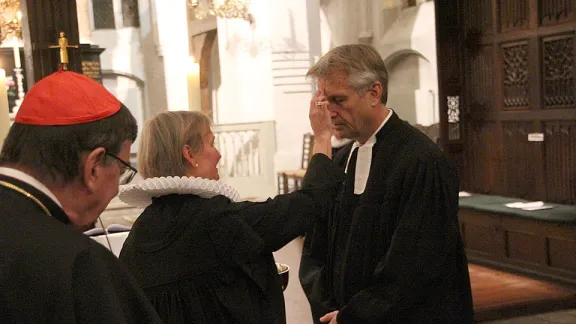
Evangelical Lutheran Church in Northern Germany Bishop Kirsten Fehrs (center) makes the sign of the cross on LWF General Secretary Rev. Martin Jungeâs forehead in a symbolic affirmation of baptism during worship at the 2012 VELKD general synod. Left is Kurt Cardinal Koch, president of the Pontifical Council for Promoting Christian Unity. © LWF/GNC
Body Language in the Bond of Ecumenical Fellowship
During an ecumenical worship service at the General Synod of the United Evangelical Lutheran Church of Germany (VELKD) Lutheran and Roman Catholic church leaders jointly made a symbolic affirmation of the common baptism of Christians.
The Lutheran World Federation (LWF) General Secretary Rev. Martin Junge jointly with Kurt Cardinal Koch, president of the Pontifical Council for Promoting Christian Unity, and Bishop Kirsten Fehrs, Evangelical Lutheran Church of Northern Germany, made a sign of the cross with water on the foreheads of over 100 worshippers attending the 2 November service in Lübeck, northern Germany.
“Baptism binds us Christians beyond all differences,” said Junge. “It is good for us to recall this ecumenically at regular intervals,” he added.
The affirmation of baptism ceremony was based on an order of service from VELKD’s newly revised liturgical guide for remembering baptism, which was approved at the synod, and is expected to be ready for use in the congregations next year. The VELKD is a union of seven Lutheran churches in Germany.
Act of Baptism as the Church’s Body Language
In his address to the VELKD synod earlier, Junge, focusing on the topic “Reformation and Inculturation,” had underlined the importance of the church’s body language.
The radical, unconditional love of God becomes a liberating message, “not only through proclamation in the Reformation understanding but, in particular, through the body language with which the church encounters people,” he said.
Baptism is one of the most concrete acts of this body language. “The church’s body language—it actually speaks, sometimes more than words!” Junge emphasized.
Collection to Support Syrian Refugees
The collection taken at the service signaled the close ties between VELKD and the LWF, as half of it was dedicated to the work of the Department for World Service in Jordan. On the invitation of the Jordan Hashemite Charity Organization, the LWF supports Syrian refugees in that country with winter clothing, winterized tents and psychosocial assistance.
The VELKD has the status of a recognized council of churches within the LWF, and all its member churches are LWF members.
(Written for LWI by Florian Hübner, public relations officer of the LWF German National Committee)


